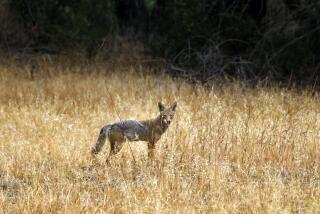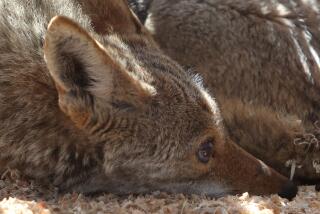ROCKY MOUNTAIN BRIEFING
HUNTING FUROR: First there was the prairie dog shoot last July, and now there is the coyote shoot.
Colorado House Minority Leader Ruth Wright would like to put a stop to it all. During this first week of the 1991 session, Wright plans to introduce a bill that would prohibit animal-killing contests. But the bill, which would still allow trophy contests during hunting season, could not take effect in time to block the coyote hunting contest planned for Saturday.
Wright recalled the outcry that was raised last summer over a prairie dog shoot that was sponsored by the economically hard-bitten communities of Nucla and Naturita. In that contest, more than 100 hunters from 11 states paid $100 entry fees to compete for $7,000 in prizes. The contestants killed 2,956 prairie dogs, and local businesses netted about $300,000.
Now, two ranchers in Baca County, an arid cattle ranching corner of the state on the Oklahoma-Nebraska border, are planning a coyote contest with $2,500 in prize money for the two-person team that can call and kill the most coyotes. Fifty team slots were filled within a day of the event’s being announced.
Contest promoter Wes McKinley, an owner of the Kirkwell Cattle Co., says the coyote population is out of control. “The coyotes are getting our little schnauzer dogs,” he said. “That is an unnatural thing for a coyote to do . . . . They’ve already eaten all the rabbits.”
Shooting coyotes in Colorado is legal but requires a small-game license. Colorado Division of Wildlife records show that more than 30,000 coyotes were taken in 1983, the last year for which figures are available. Officials say far fewer may have been taken in recent years because the price of pelts has dipped dramatically. There are 50,000 to 100,000 coyotes in the state, wildlife officials estimate.
FLAG FLAP: A year ago, Dieter Hantschel was in Europe, where he witnessed the jubilation over the destruction of the Berlin Wall. “It gave me goose bumps,” he said. “I saw the U.S. flag flying all over Eastern Europe.”
Upon returning to his recently purchased home in Stroh Ranch, a development south of Denver, Hantschel installed two flagpoles and raised the U.S. and state flags. Within three days, he received notice from the management of Stroh Ranch, which markets itself on an Americana theme, that his flags would have to go.
John Macdonald, a spokesman for Stroh Ranch, said: “We’re not opposed to him displaying the flag as long as it is approved by the committee ahead of time. We had complaints about noise, and some people don’t feel flagpoles are appropriate for a residential community.” Hantschel continues to fly his flags--not too far from the ones nearly double in size that fly outside the Stroh Ranch Recreation Center and model homes, while attorneys for developers review options that could force him to strike his colors.
ASPEN TRASH: The glitzy trash discarded by residents of Aspen has presented Pitkin County with a gold mine of sorts. Last year, the county’s resale and recycling effort grossed more than $150,000, public resources manager Jim Duke said.
Although the biggest seller is soil, the dump also sells classy castoffs. “We’ve had hot-air balloons, hot tubs--they usually go real quick--couches and even chairs from an old chairlift,” he said. Most items sell for between $5 and $25.
There’s not much demand locally for the hard goods. “But if we just take it 10 miles downstream, it’s gone in 10 minutes,” Duke said.
More to Read
Sign up for Essential California
The most important California stories and recommendations in your inbox every morning.
You may occasionally receive promotional content from the Los Angeles Times.










